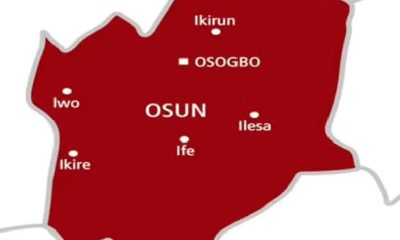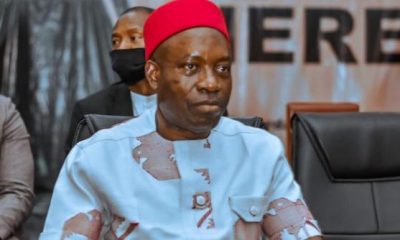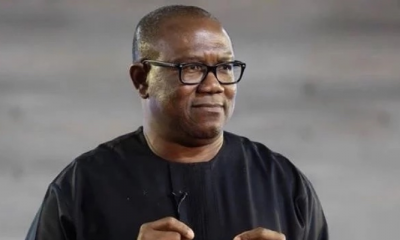News
Lockdowns Are Ineffective Without Sustainable Economic Plans For Citizens -Soludo, Former CBN Governor

Professor Charles Soludo, former governor of Central Bank of Nigeria, CBN, and a member of President Muhammadu Buhari’s Economic Advisory Council in an article has faulted Africa’s response to the Coronavirus disease(COVID-19) by issuing lockdowns without creative solutions suited for its people as an ineffective approach.
He described the lockdown/closure of the borders in Africa as ineffective posing a two-pronged problem that has the potential to worsen the continent’s health and economic challenges if not handled with creative solutions.
“All lives matter and African governments must do everything to protect or save every life from the pandemic. The challenge is how. Africa faces two unsavoury options: the conventional template, including lockdowns versus heterodox (creative local), approaches without a lockdown,” he said.
According to him, lives would be lost in both approaches as Africa has no credible exit strategy aside from the lockdowns that have no reasonable timeline which is a suicidal approach to its economy.
“The idea of a lockdown (and border closure) implies that you will continue to do so (with extensions) until such a time that you are satisfied that the spread of Covid-19 has been arrested or on the decline (with the possibility of imposing another round of lockdown if new infections surge).
“The length of time required for such lockdowns to ensure “effectiveness” in arresting the spread would make it near impossible in much of Africa. If the strategy is to lockdown until infections stop/significantly decline or so, then we would have a suicidal indefinite waiting game,” he stated.
Professor Soludo outlined the problems associated with the disease which has made it difficult for African countries to effectively address because of its economic capacity and cultural disposition to communal living.
“African states cannot pay for lockdowns. Many countries depend on budget support from bilateral and multilateral donors, and with its acute balance of payments problems. Most are now begging for debt relief and applying for urgent loans from the IMF and the World Bank. In Africa, both the governments and the people are begging for “palliatives”.
“The most that African states and their private charities can do is “photo charity” with much fanfare, drop a few currency notes or grains here and there for some thousands when millions are in desperate need, just to be seen to have “done something”, he said.
In a report, the World Bank warns that Sub-Saharan Africa, the world’s largest rice-importing region, could be heading from a health crisis straight into a food security crisis due to the disruptions caused by the coronavirus.
The former CBN governor stated that the African continent cannot identify its vulnerable to benefit from its “palliatives” because of its inability to harness a credible demographic data of its citizens.
“At a fundamental level, most African states do not have credible demographic data to identify and target the most vulnerable. In the western societies from where we copied the lockdown/border closure, their citizens are literally paid to stay at home (by silently dropping monies into their accounts plus other incentives),” he said.
On the social distancing, Soludo highlighted it is impractical to practice in Africa because social clustering amongst people on the continent has an economic advantage.
“From the shanties in South Africa’s townships to the crowded Ajengule or Mararaba in Abuja/Nasarawa, or Cairo or Kinshasa to the villages and poor neighbourhoods in much of Africa, social clustering, not distancing, is the affordable, survivalist culture.
“The question is the end game for a poor society such as Africa? New infections have re-emerged in Wuhan, and both Singapore and South Korea are going back to the drawing board. Since we cannot sustain lockdowns indefinitely or even until the spread declines, it means that we would sooner or later remove the restrictions. What happens then?” he queried.
Without adaptable sustainable solutions suited for the African continent, Soludo said opening the borders of the African continent is a smart solution consistent with Africa’s financial and social realities.
“Our model should be learning-by-doing while mainstreaming basic common-sense tips such as the mandatory wearing of masks in public, basic hygiene, disinfection of all open markets every early morning and all places of public gatherings, practical social distancing tips, etc,” he affirmed.
Stating that the pandemic was an opportunity for Africa to exploit its economic survival options without putting the lives of people on hold.
“Can you imagine the thousands of jobs to be created in producing face masks, hand sanitizers, gloves, etc for 1.3 billion people? But this cannot happen under a lockdown. New opportunities! Everyone wants to live, and Africans will learn and adapt quickly.
“Staying at home will become a choice, not a compulsion. The slogan could be: “stay at home if you can, or smartly go to work if you must”. We can only defeat the challenge by confronting it, and not by playing the ostrich only to still confront it the day after,” he said
Source: ICIR
-

 Opinion5 days ago
Opinion5 days agoThe Clout-chasing Dipo Awojide By Comrade Da’Peace
-

 News4 days ago
News4 days agoRamadan, Lent: Shettima Calls For National Unity And Compassion
-

 Opinion4 days ago
Opinion4 days agoReinventing Osun’s Economy Through Dagbolu Intl. Trade Centre: From Quiet Market Lessons To Regional Trade Revolution By Adeboye Adebayo
-

 News4 days ago
News4 days ago‘Wike Factor’: Another PDP Chairmanship Candidate Steps Down For APC In FCT










